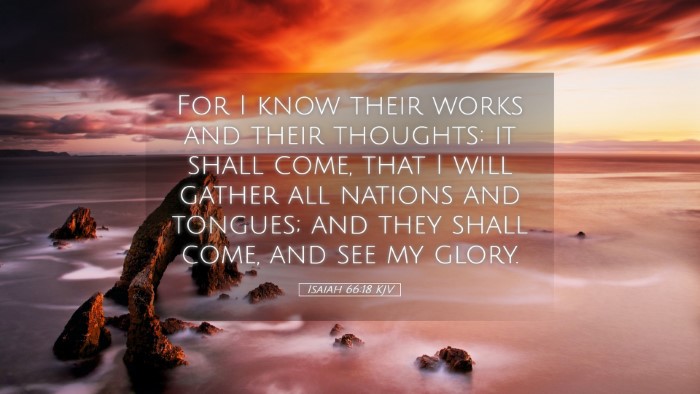Commentary on Isaiah 66:18
Introduction
Isaiah 66:18 encapsulates a profound aspect of God's omniscience, as well as His ultimate plan for all nations. As we delve into this verse, we gather insights from esteemed commentators like Matthew Henry, Albert Barnes, and Adam Clarke, helping to elucidate its theological significance.
Text of Isaiah 66:18
"For I know their works and their thoughts: it shall come, that I will gather all nations and tongues; and they shall come, and see my glory."
Historical Context
This verse sits at the culmination of the book of Isaiah, a prophetic work that addresses the people of Israel amid their tumultuous historical journey. Isaiah prophesies about both impending judgment and the restoration of Zion, emphasizing God’s sovereignty over all nations.
Exegesis and Insights
1. Divine Knowledge of Human Actions
Matthew Henry emphasizes the comprehensive nature of God's knowledge. He states, “He knows their works and their thoughts,” which indicates not only visible actions but also the motivations of the heart. In a world prone to hypocrisy and pretense, this reminder is vital for both leaders and laypeople.
2. The Inclusivity of God's Plan
Albert Barnes comments on the universality of God's redemptive plan, reflected in the phrase “I will gather all nations.” This highlights a shift from a predominantly Israel-centric focus to a global vision that embraces all tongues and ethnicities. The gathering signifies God’s intent to draw all people to Himself, an essential prelude to understanding the New Testament's Great Commission.
3. The Vision of God's Glory
Adam Clarke provides a profound insight into the nature of God's glory. He notes that “they shall come, and see my glory” illustrates not just a visual manifestation but an experiential and relational engagement with the divine. This glory is both a revelation of God's character and a source of transformation for those who encounter it.
Theological Implications
The verse holds significant implications for theology, particularly concerning the doctrines of revelation and salvation.
- God's Sovereignty: The verse affirms God's ultimate authority over humanity and history.
- Inclusiveness of the Gospel: It serves as a precursor to the missional aspect of the church, underlining that salvation is open to all, transcending cultural and ethnic boundaries.
- The Nature of God’s Work: It challenges believers to examine their own works and thoughts, highlighting that God is intimately aware of the human condition.
Application for Believers
This passage invites deep introspection for believers and leaders alike. Pastors are reminded of their calling to preach to all nations, recognizing God's desire for inclusivity in His family. The verse also prompts individual Christians to align their works and thoughts with God's will, being assured that nothing escapes His notice.
1. Reflective Practice
Believers are encouraged to reflect on their thoughts and actions in light of God’s omniscience and glory. How does the knowledge that God sees all inspire a deeper commitment to live righteously?
2. Missional Living
As the church, there is a call to engage in mission work with the assurance that God’s glory is to be revealed among all nations. This can be a rallying cry for churches to step outside their comfort zones and embrace diversity in ministry.
3. Anticipation of God’s Glory
Clarke’s interpretation encourages the anticipation of God’s glory, inspiring believers to look forward to the day when all will see His manifested presence. This hope serves as a foundational pillar for faith amidst trials.
Conclusion
Isaiah 66:18 serves as a powerful reminder of God's omniscience and His overarching plan for humanity. Through the combined insights of Henry, Barnes, and Clarke, we see that this verse not only challenges us personally but also expands our understanding of God's divine mission for all nations. As we embrace these truths, may we inspire a movement towards unity in diversity, where God’s glory is ultimately revealed in the hearts of many.


